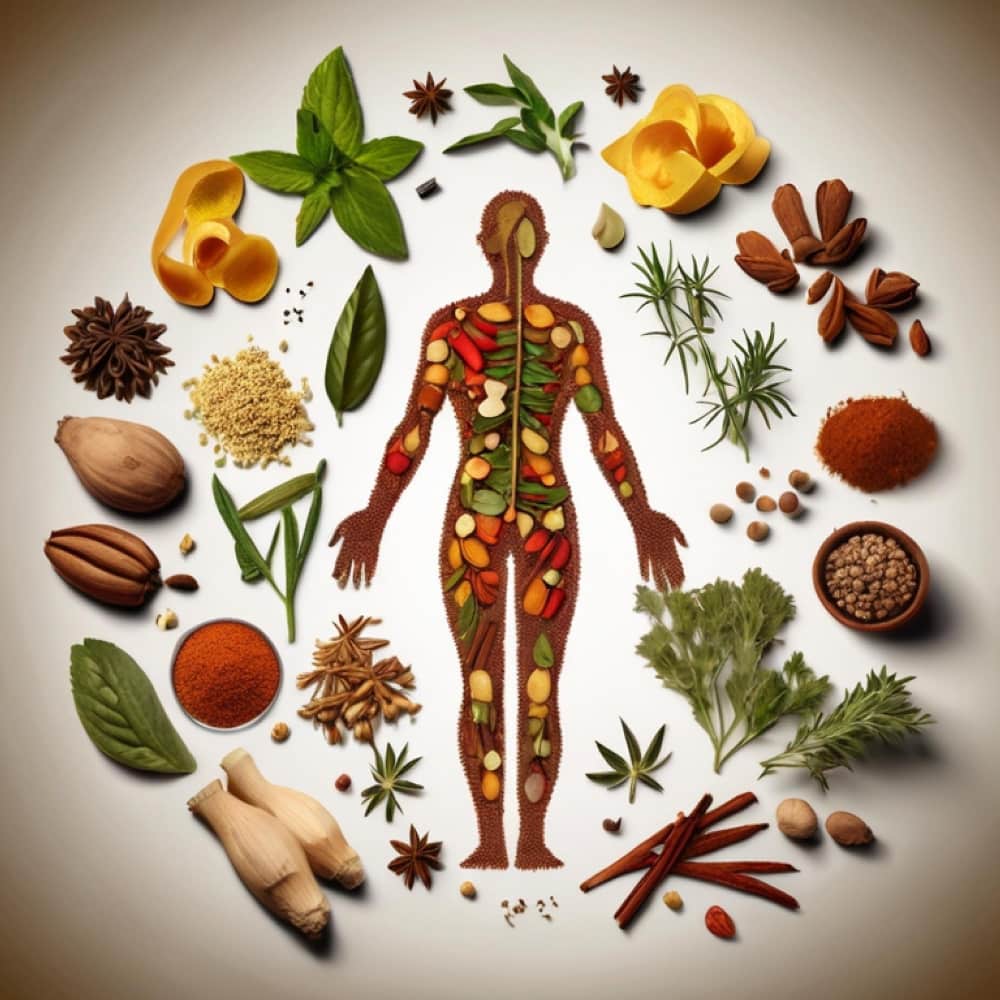How to Improve Digestion with Ayurveda?
Digestive health is the foundation of overall well-being in Ayurveda. According to this ancient Indian system of medicine, our ability to digest food properly affects not just our physical health, but also our mental and emotional well-being. Ayurveda places significant emphasis on maintaining a strong digestive system, often referred to as “Agni” or the digestive fire. A balanced and robust Agni is considered the key to vibrant health, while a weakened or imbalanced digestive fire leads to the accumulation of toxins (Ama) and can result in disease.
In this article, we will explore how to improve digestion with Ayurveda, including Ayurvedic principles for gut health, the role of digestive fire, how to increase stomach acid naturally, and specific Ayurvedic herbs that promote healthy digestion. Whether you’re looking to alleviate digestive discomfort or boost overall gut function, these Ayurvedic practices will help you restore balance and vitality to your digestive system.

The Importance of Digestive Health in Ayurveda
In Ayurveda, digestion is seen as the cornerstone of health. Every meal and every digestive experience is an opportunity to support or hinder your health. When digestion is strong, the body is able to extract vital nutrients from food and efficiently eliminate waste. Conversely, poor digestion leads to an accumulation of undigested food and toxins, which are known as Ama.
Ama is described as a sticky, heavy substance that clogs the channels in the body, disrupts proper organ function, and leads to various health issues. By improving digestion, we not only remove existing toxins but also prevent new Ama from forming, ensuring the body stays in a state of balance.
Understanding Agni: The Digestive Fire
The concept of Agni is central to Ayurveda’s understanding of digestion. Agni refers to the digestive fire or the metabolic energy responsible for breaking down food, absorbing nutrients, and transforming them into energy for the body. Just as a strong fire cooks food well, a strong Agni helps the body to digest food properly and absorb essential nutrients.
There are four types of Agni:
1. Sama Agni (Balanced Agni)
This is the ideal state, where digestion is neither too fast nor too slow. It indicates a perfectly functioning digestive system.
2. Tikshna Agni (Sharp Agni)
Associated with an overactive digestive system, this can cause rapid digestion, leading to acidity, heartburn, and other Pitta-related issues.
3. Manda Agni (Dull Agni):
This is a sluggish digestive fire, often linked to the Kapha dosha, resulting in slow digestion, bloating, and lethargy
4. Vishama Agni (Irregular Agni):
Related to Vata imbalances, this type of digestive fire is unpredictable, causing symptoms like gas, bloating, constipation, and irregular appetite.
Restoring balance to Agni is a key aspect of promoting Ayurveda digestion. To achieve this balance, it’s essential to understand your dosha (body constitution) and the specific digestive issues you may be facing.

Ayurvedic Principles for Gut Health
1. Eating in Accordance with Your Dosha
Ayurveda classifies individuals into three main doshas: Vata, Pitta, and Kapha. Each dosha has its own unique digestive tendencies, and balancing your digestion begins with recognizing your dosha and adjusting your diet accordingly.
Vata digestion:
Vata types tend to have irregular digestion and often suffer from gas, bloating, and constipation. To balance Vata digestion, it’s essential to eat warm, grounding foods like soups, stews, and root vegetables, and avoid cold, raw foods
Pitta digestion:
Pitta types typically have strong digestion but are prone to acidity, heartburn, and inflammation. They should focus on cooling, slightly bitter foods, such as leafy greens, cucumbers, and sweet fruits, while avoiding spicy, oily, and fried foods.
Kapha digestion:
Kapha types often have slow digestion, which can result in heaviness, sluggishness, and weight gain. To support Kapha digestion, opt for light, spicy, and astringent foods, like lentils, vegetables, and warming spices like ginger and black pepper.
2. Mindful Eating Habits
Ayurveda teaches that how you eat is just as important as what you eat. Here are some essential mindful eating practices to enhance your digestive health:
Eat at regular intervals:
Having meals at consistent times each day helps synchronize your digestive fire with your body’s internal clock.
Avoid overeating:
Eating too much can overwhelm your digestive system and weaken Agni. It is recommended to eat until you are 75% full.
Chew your food thoroughly:
Digestion begins in the mouth, and chewing your food properly allows enzymes in your saliva to begin the digestive process.
Avoid distractions while eating:
Eating mindfully without distractions such as TV or work allows your body to focus on digestion.
3. Stay Hydrated, But Not Overhydrated
Drinking water is essential for proper digestion, but the timing and amount matter. Ayurveda suggests drinking small sips of warm water or herbal tea during meals to aid digestion. However, drinking large amounts of cold water, especially during meals, can dilute digestive enzymes and weaken Agni.

4. Eat the Largest Meal at Noon
Ayurveda follows the natural rhythms of the day, often referred to as the Ayurvedic clock. According to this principle, the digestive fire is strongest between 10 a.m. and 2 p.m., when the sun is at its peak. It’s advised to eat your largest meal during this time to align with your body’s natural ability to digest efficiently.
Restore your digestive fire with time-tested Ayurvedic herbs and remedies.
From Triphala to Ginger blends – shop holistic gut support now.
Ayurvedic Herbs for Gut Health
Ayurveda offers a wide variety of herbs that have been used for centuries to support digestion and enhance gut health. Incorporating these Ayurvedic herbs for gut health can help maintain a balanced digestive system:
1. Triphala
A combination of three fruits—Amla, Haritaki, and Bibhitaki—Triphala is one of the most revered herbs in Ayurveda for digestive health. It helps cleanse the digestive tract, promotes regular bowel movements, and balances all three doshas.
2. Ginger
Ginger is known as the universal medicine in Ayurveda, ginger stimulates Agni, aids digestion, and reduces nausea and bloating. It’s especially beneficial for Vata and Kapha types.
3. Turmeric
A potent anti-inflammatory and antioxidant, turmeric supports liver function, improves digestion, and helps detoxify the body. It is particularly useful for balancing Pitta-related digestive issues like acidity.
4. Cumin
Cumin seeds aid digestion by stimulating enzymes that break down food, making it easier for the body to absorb nutrients. Cumin is especially helpful for Kapha and Vata types.
5. Fennel
Fennel seeds are commonly used after meals to improve digestion, reduce gas, and relieve bloating. It is cooling and helps soothe Pitta-related digestive issues.
6. Cardamom
This warming spice helps stimulate digestion and balance Vata and Kapha doshas. Cardamom can be added to teas or meals to enhance digestion and reduce bloating.
7. Black Pepper
Known for its ability to enhance the bioavailability of other herbs, black pepper also supports digestion by increasing digestive fire and reducing Kapha dosha.

How to Increase Stomach Acid with Ayurveda?
One common issue with weak digestion is low stomach acid, which can lead to poor nutrient absorption and indigestion. In Ayurveda, boosting the digestive fire (Agni) is a natural way to increase stomach acid and improve digestion.
Here are some Ayurvedic tips for increasing stomach acid
1. Ginger Tea
Drinking ginger tea 20 minutes before meals helps stimulate stomach acid production and enhances overall digestion.
2. Lemon and Warm Water
A simple drink of warm water with lemon juice in the morning can help increase stomach acid and prepare your digestive system for the day
3. Herbal Digestive Aids
Consuming herbal blends like Triphala or Churna (digestive powder made of fennel, cumin, and coriander) before meals can stimulate Agni and improve stomach acid production.
4. Eating Bitter Greens
Bitter foods, such as dandelion greens or kale, help trigger the production of stomach acid and digestive enzymes.
5. Chew Your Food
Thoroughly chewing food signals your stomach to release the necessary digestive acids, promoting efficient digestion.
Detox in Ayurveda: The Role of Cleansing in Digestive Health
Detoxification, or the removal of toxins (Ama), is an essential component of Ayurvedic digestive health. Periodic cleanses help reset the digestive system and eliminate accumulated toxins that can lead to illness.
There are several methods of detox in Ayurveda, including:
1. Panchakarma
This is Ayurveda’s most comprehensive detox process, involving a series of therapeutic procedures to cleanse the body, mind, and spirit. Panchakarma includes techniques like herbal oil massages, therapeutic vomiting, enemas, and nasal cleansing to remove toxins and balance the doshas.
2. Kitchari Cleanse
A simpler home detox method involves eating kitchari, a traditional Ayurvedic dish made from rice and mung beans. This mono-diet is easy to digest and helps cleanse the digestive system.
3. Fasting and Intermittent Fasting
Ayurveda also advocates for fasting or intermittent fasting as a way to give the digestive system a break and allow the body to eliminate toxins naturally.
4. Herbal Detox Teas
Drinking herbal teas made from detoxifying herbs like Triphala, ginger, turmeric, and fennel can support the body’s natural cleansing process and promote healthy digestion.
Conclusion
Ayurveda provides a wealth of time-tested wisdom for improving digestion and maintaining optimal gut health. From the concept of Agni and mindful eating habits to the use of powerful Ayurvedic herbs and detoxification practices, there are numerous ways to enhance your digestive system naturally.
Incorporating these Ayurvedic principles into your daily routine can lead to better digestion, improved energy levels, clearer skin, and overall well-being. Whether you’re looking to balance your doshas, boost your digestive fire, or cleanse your body of toxins, Ayurveda for gut health offers a holistic approach that addresses the root causes of digestive issues and promotes long-term health.












